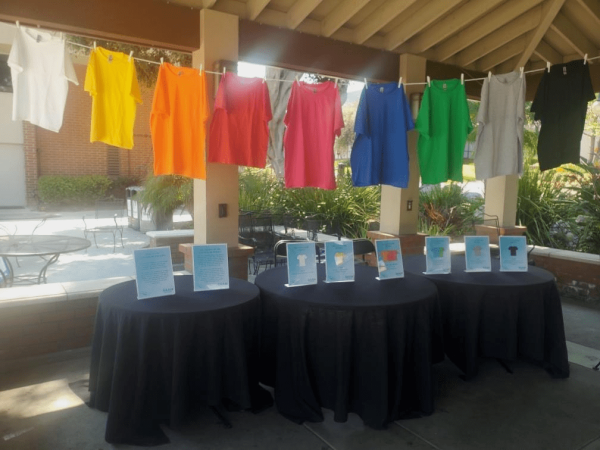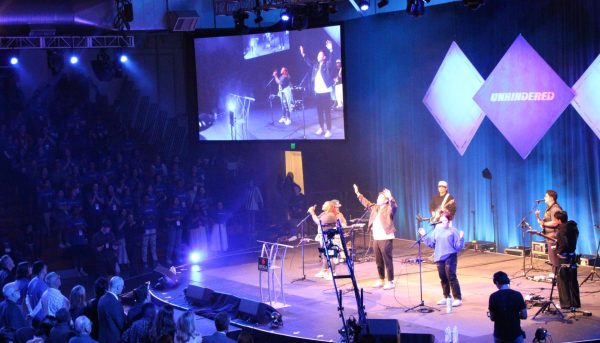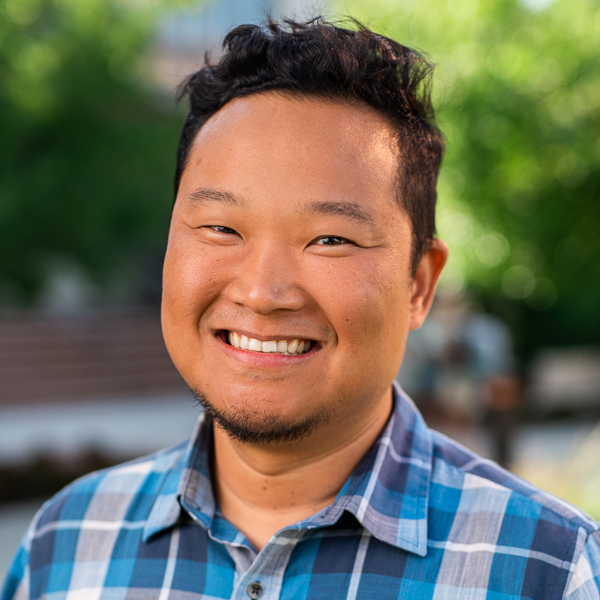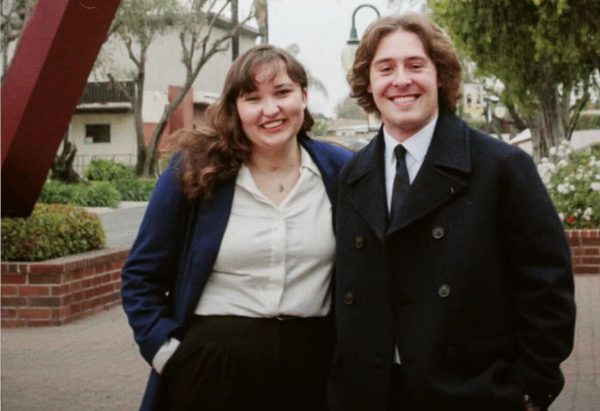Hot topics hit at Metzger’s first town hall
President Corey and other top Metzger officials talk about improving Biola’s Internet speed, revising the school’s dancing policy and the progress of the provost search.
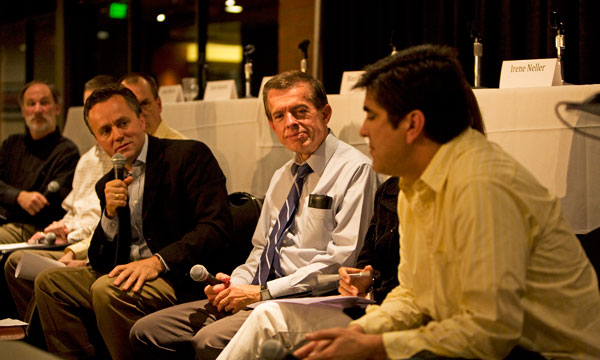
(L-R) President Corey; Greg Balsano, vice president of university services; and Christopher Grace, vice president for development and university planning interact during Thursday’s town hall in the Caf. The panel, made up of top Biola officials, addressed a range of issues including the provost search and on-campus dancing. | LINDSEY MINERVA / The Chimes
April 16, 2010
(Scroll down for point-by-point report of the town hall)
An unexpectedly small audience of around 35 students, and a handful of faculty and staff, attended the Student Town Hall in the Caf last week.
The town hall, the first of its kind with President Corey and his council in attendance, is part of Corey’s strategy to effectively communicate with students, according to Brenda Velasco, manager of internal communications and public relations. The low student turnout was an unexpected development in this strategy.
“We will have scholarships for all of you for attending tonight,” Corey joked with the sparse crowd.
An eight-member panel consisting of President Corey and his President’s Administrative Council (PAC), fielded pre-submitted student questions. AS President Mark Heath served as moderator and posed the questions. Heath also opened the floor to audience inquiries after the original questions were answered. The press conference, scheduled to follow the town hall, was canceled due to the low student turnout.
Students who missed the event also missed out on many important university announcements. Chris Grace, professor of psychology and vice president for Student Development and University Planning, announced Biola’s Internet bandwidth would increase from 100 MBP (megabits per second) to 400 MBP by mid-summer. That will mean faster Internet school wide.
Corey mentioned that a new science facility was in the works, though it would not be built within the time of current students. Corey also discussed Biola’s continued interest in Los Angeles and the hope of collaborating with other organizations to maintain a strong connection with the city.
Students also suggested various improvements to enhance the Biola experience. One student proposed creating a U.S. history class specifically designed for international students without an extensive U.S. history background. Another student asked if a course in Mandarin Chinese would be offered soon. These additions are being considered by Corey and his council, though, if implemented, would not appear in the near future.
Velasco said the event would be assessed to decide whether or not it should be a continuing event on Corey’s schedule. Jenna Bartlo, media relations coordinator, promised that students could anticipate similar events in the future.
“This year was a great starting block for future town hall meetings and opened avenues towards deeper conversations and communication between higher administration and students,” Bartlo said.
Linzy Spann, AS chapel board chair, was dismayed by the low attendance.
“I was disappointed that more students did not take advantage of the opportunity,” she said. “It’s not every day that you can directly communicate with the president and his council, let alone in such an open environment.”
Spann was not the only member of student leadership in attendance. Lizzie Neely and John Drebinger, AS president-elect and senior vice president-elect, and SMU President-elect Luke Payton, were among the audience members. Payton, who heard about the town hall by word-of-mouth, believed the poor advertising of the event contributed to the low attendance numbers. Payton was still impressed with the quality of the forum, however.
“I felt that the questions presented were very well selected and covered a number of issues present here at Biola,” he said.
The discussion during the event was candid, allowing Corey and the PAC to address pertinent issues and students to voice their opinions.
Payton hopes town halls will continue, despite the low turnout.
“I highly support this event and look forward to seeing more of them in the future,” he said. “I think it’s always a great opportunity for students to interact with their leadership and stay current with what’s happening at Biola.”
Topics covered
Last names will be used to reference panel members. See sidebar for full name and title
Speed of Biola’s Internet: “I was looking it up on the Internet, but it’s still downloading,” Grace joked. Jesting aside, Grace said Biola’s Internet, provided by Verizon, currently has a bandwidth of 100 mbps (megabits per second). This will increase to 400 MBP by June.
Improving the science facilities: Corey said current students would probably not see a new science facility before they graduate. Architects have been hired to draft a plan for a new science building, which will be presented to the Board of Trustees in a few weeks. The funds will come from donors, not student tuition. Financial aid: Vaughan said the Board of Trustees has an affordability task force focused on keeping Biola reasonably priced. Tuition increases in the last two years have been the lowest percentage increase in the last five years. The scholarship budget was increased by $1 million this year by cutting operational budgets. Dancing: Social dancing is currently prohibited under Biola’s community standards. President Corey made a commitment last semester that he would reach a decision on changing the dance restriction by the end of this school year. He said he intends to fulfill that commitment. Addressing major cultural issues: Corey stressed that Biola has a biblical agenda before it has a political agenda. “There’s something about a university that has deep-seated, Christ-honoring convictions that is not out to become combative on all of the issues,” Corey said. Biola students need to be winsome, receivable and engaging without picking a fight, he said. Provost search: Corey believes Biola is making good progress in finding a qualified person to fill the position. Important interviews will occur during the ensuing weeks. He stressed the importance of making the right decision instead of simply making a hasty one. At least five candidates are currently being considered. Balancing theology and the Spirit: “Are we making sure that when our students graduate, they are thinking biblically and acting biblically?” Corey asked. He believes students need to grapple with theology but also be alert to the Holy Spirit’s work. Grace added that faculty and staff are trained to be good role models for students. Going green: Balsano said Biola’s power plants generate about 80 percent of its electricity through the combustion of natural gas, which gives off very little pollution. Biola is also using environmentally friendly cleaning agents and requiring any new building projects to meet LEED (Leadership in Energy and Environmental Design) certification. Local evangelistic focus: “We have so many ministries focused in this area,” Grace said. He believes students’ lives will make an impact wherever they go. Corey added that Biola is committed to being intentionally involved in Los Angeles and is exploring methods of implementing that strategy in collaborative ways.Juliana Rinaldi contributed to this report


